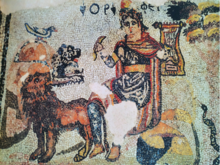 | |
| Location | Gllamnik, Podujevë, Kosovo |
|---|---|
| Region | District of Pristina |
Vendenis was an ancient city in Dardania in Kosovo.[1][2][3] Among three road stations that were constructed in Dardania during the Roman Period, Statio Vindenis, is one of the identified stations. This archaeological site is set at the area of the village of Gllamnik. The site is located approximately 5 kilometres (3.1 miles) south of Podujevë.[4]
History
[edit]The ancient Via Lissus-Naissus Roman road was a diagonal route, connecting the central Balkans region with the Adriatic coast, which passed through Vindenis. The settlement and Roman road station of Vindenis are stretched on the right bank of Llapi River vicinity, measuring an area of more or less of 15-20 hectares. During the 1980s, systematic archaeological excavations carried out at this site, uncovered an area in total of 550 km2 (212 sq mi).
Among recorded archaeological findings and features here, the most characteristic ones are the grave burials with the grave goods. The burial rites documented here, tell us about the practise of cremation and inhumation burial rites. Besides, a heavy marble sarcophagus was discovered, most probably especially prepared for a distinguished person of high economical, social and political status. Nonetheless, archaeological investigations identified several dwellings, and in particular a distinguished discovery of a floor mosaic composed with geometrical motifs, at the central part of the mosaic, the figural display panel of the Orpheus, makes this mosaic a special discovery. A special finding discovered at this site, is a gold wedding ring with a cameo which clearly indicates shaking of the right hands, which means an agreement but also symbolizes loyalty and friendship.
Geophysical, geomagnetic surveys or prospection’s conducted at this locality in 2008 and 2011, in an area of at least 11 hectares of this important archaeological site, identified traces of remains of different objects that at the first impression, resemble to a military field garrison, most probably stationed there to protect the surrounding area and the road station. The archaeological site of Vindenis, was active during the entire period of the Roman rule as well as during the late antiquity.[5] It is one of the road stations situated between Ulpiana and Naissus drawn on the Tabula Peutingeriana.[6][7]
See also
[edit]References
[edit]- ^ Kraja, Mehmet, ed. (2018). "Fjalori Enciklopedik i Kosovës". (Encyclopedic Dictionary of Kosova) (in Albanian). Vol. 2. Prishtinë: Akademia e Shkencave dhe e Arteve e Kosovës. p. 1733. ISBN 9789951615846. OCLC 1080379844.
- ^ Lafe, Emil, ed. (2008). "Fjalor Enciklopedik Shqiptar". (Encyclopedic Dictionary of Albania) (in Albanian). Vol. 3. Tiranë: Akademia e Shkencave e Shqipërisë. pp. 2870–2871. ISBN 9789995610272. OCLC 426069353.
- ^ "Vendenis, Kosovo - Geographical Names, map, geographic coordinates".
- ^ Dobruna-Salihu Exhlale. Altari i Dea Dardanicae dhe stacioni beneficiar nga Vendenisi (A votive altar of Dea Dardanica and a beneficiary station from Vendenis). In: Iliria, vol. 35, 2011. pp. 243-254. DOI: https://doi.org/10.3406/iliri.2011.1108
- ^ Milot Berisha, Kosovo Archaeological Guide,Prishtinë, Kosovo Archaeological Institute and Ministry of Culture, Youth and Sports, 2012, Pg.62.
- ^ "Rimski put Naissus -Lissus (Archived copy)". Archived from the original on 2011-08-26. Retrieved 2010-12-10.
- ^ F. Teichner, A. Drăgan, R. Dürr, Vindenis (Glavnik/Gllamnik, Kosovo). "Roman Military Presence in the Heart of the Dardanian Mining District". In: C. S. Sommer / S. Matešic (éds.). Limes XXIII. Proceedings of the 23rd International Congress of Roman Frontier Studies. Ingolstadt 2015. Mainz: 2018. pp. 426-436.










